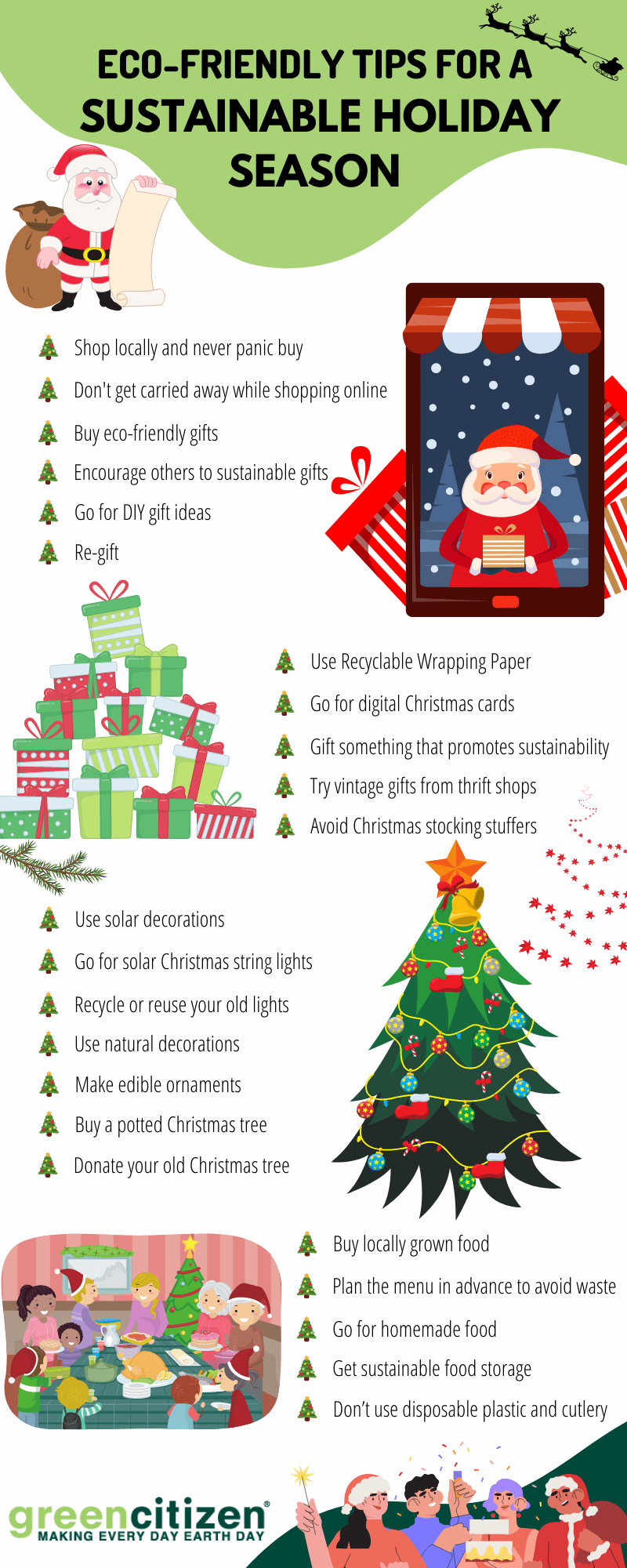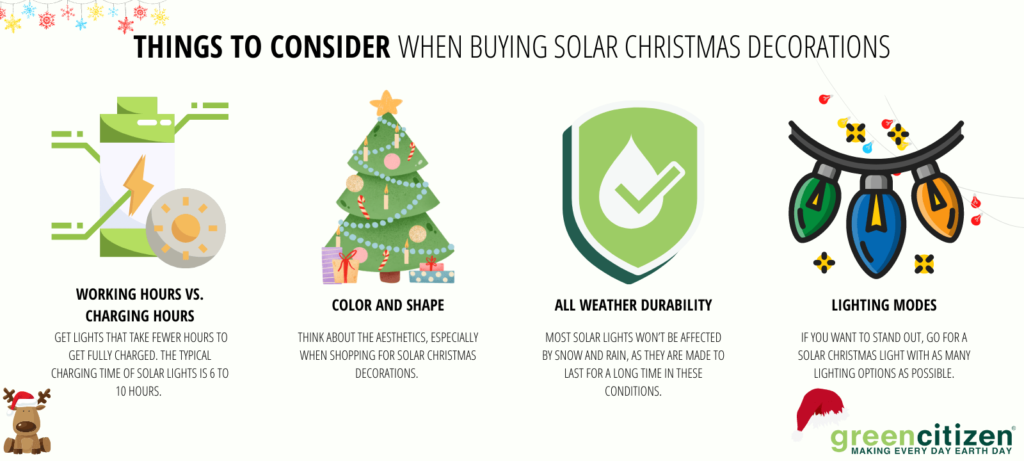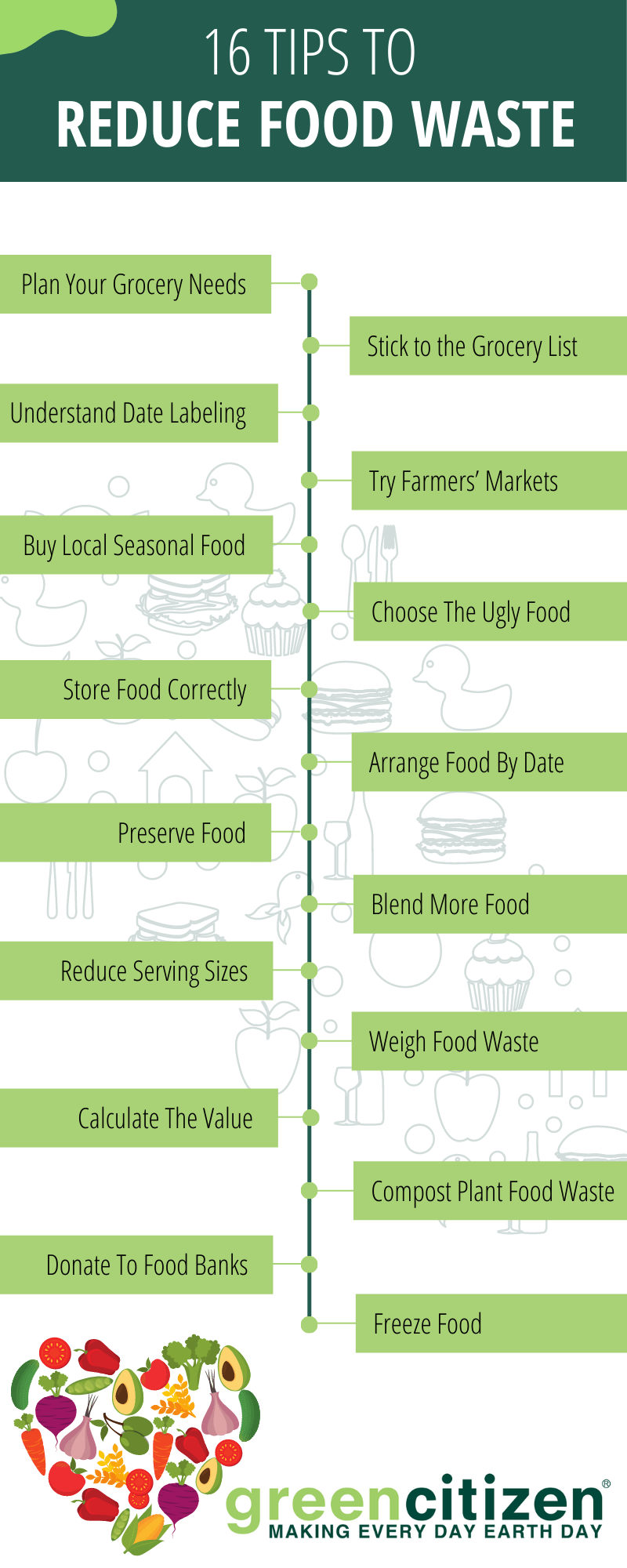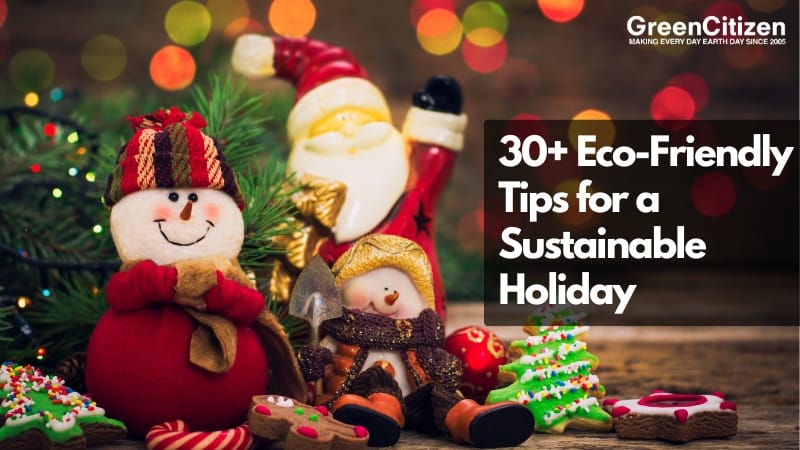It’s that magical time of year again—twinkly lights, big meals, and all the cozy traditions we love.
But the holidays are also one of the most wasteful times of the year. In the U.S., households throw away about 25% more trash, adding roughly an extra million tons of garbage each week between Thanksgiving and New Year’s.
If you adore the holidays but hate the overflowing trash bags afterward, you’re not alone.
The good news? You don’t have to cancel Christmas (or any celebration) to be kinder to the planet. With a few simple tweaks to how you shop, gift, decorate, and handle food, you can enjoy a joyful, low-waste holiday season.
Below are the sustainable holiday tips I’m actually using to make my celebrations more eco-friendly—without sacrificing any of the fun. Let’s dive in.
Key Takeaway:
To have a sustainable holiday, focus on low-waste shopping, thoughtful gifts, energy-efficient decor, smarter food planning, and greener travel. Shop locally, avoid panic buying, reuse or recycle gift wrap, plan portions and use leftovers, and choose lower-carbon transport so you can enjoy the season without overflowing trash bags or guilt.
How Can I Have A Low-Waste, Sustainable Holiday?
To have a sustainable holiday, focus on five key areas:
- Mindful shopping,
- Low-waste gifts,
- Eco-friendly decor,
- Smarter food planning, and
- Greener travel and clean-up.
Shop locally when you can, avoid panic buying, choose reusable or digital gifts, swap to LED or solar lights, plan portions to reduce leftovers, and donate or recycle what you don’t use instead of sending it to landfill.
Even changing just one or two habits each year makes a difference.
What Is A “Sustainable Holiday”?
A sustainable holiday is a celebration that keeps all the fun and traditions but reduces waste, pollution, and overconsumption.
It means:
- choosing lower-impact gifts and decorations,
- planning food so less ends up in the bin,
- being mindful about travel, and
- supporting eco-conscious and local businesses where possible.
It’s not about perfection or giving up joy. It’s about small, intentional choices that are kinder to the planet.

How Can I Shop More Sustainably During The Holidays?
Holiday shopping is a big source of stress — and waste. The good news? With a little planning, you can turn your gift-buying into a much more eco-friendly, low-waste experience.
Here are three sustainable holiday shopping tips:
1. Shop Locally
Holidays are traditionally when people shop the most. While this is great for vendors, it can be rough on the environment.
Here’s how I did my holiday shopping to make it more eco-friendly:
- Stay close to home. Shop in your neighborhood or pick an area where you can visit multiple stores in one trip.
- Carpool or use public transportation. This lowers transportation emissions and makes your shopping trip more fun.
- Bring your own bags. Take reusable totes and skip plastic shopping bags whenever possible.
Local shopping supports small businesses, cuts down on shipping emissions, and helps you keep your holiday footprint smaller.
2. Be Careful With Online Shopping
Online shopping can be a mixed bag for the environment.
On the one hand, you’re not driving to multiple stores across town to hunt for the perfect gift, which can reduce your carbon footprint.
But there’s a catch…
Online orders often come with tons of packaging, plastic wrapping, and extra delivery emissions.
To make online shopping more sustainable:
- Skip expedited/overnight shipping. Faster shipping usually means less efficient delivery routes.
- Choose companies with sustainable packaging. Look for brands that use recycled or minimal packaging.
- Check how far your package will travel. If you have several vendor options, pick the one that’s geographically closer or that sells locally made products.
3. Don’t Panic Buy
We’ve all done the last-minute dash where we panic buy whatever’s left on the shelf.
This year, I fought that urge by:
- Making a gift list early. Write down everyone you’re buying for and brainstorm thoughtful ideas in advance.
- Avoiding “too good to be true” deals. Those flashy discounts can trick you into buying things that aren’t actually useful.
- Personalizing gifts. One meaningful gift is worth more than a pile of generic, disposable stuff.
If you get off work a bit earlier one day, use that time to browse calmly instead of waiting until a week before Christmas when stores are crowded and your options are limited.
💡 Holiday waste is estimated at around 25 million tons of garbage, which works out to roughly one million extra tons per week during the holiday season. Every non-panic purchase helps reduce that.
What Are Eco-Friendly Holiday Gift Ideas?
Eco-friendly holiday gifts are useful, low-waste, and thoughtfully chosen. They’re often made from sustainable materials, designed to last, or created to help people live more consciously.
Here are eight ways to master sustainable holiday gifting habits.
1. Buy Eco-Friendly Gifts
You can’t guarantee someone will love your gift — but you can choose items that are kinder to the planet if they don’t keep it forever.
This year, I chose:
- gifts made from recycled materials,
- items made with organic or fair trade principles, and
- products from ethical brands with clear sustainability values.
If you need inspiration, you can also point readers to your separate blog on sustainable holiday gift ideas.
2. Choose Gifts That Help Others Make Less Waste
We all have that relative who’s pretty set in their ways. For me, it’s my grandma. She doesn’t pay much attention when I talk about eco-friendly habits — so I tried a different approach.
This year, I gifted her a cookbook for Thanksgiving leftovers. It was a massive hit! She hasn’t stopped raving about it and testing recipes.
Think of gifts that can gently change habits, such as:
- a book on upcycling or zero-waste crafts,
- a reusable carry-out container,
- a stylish reusable coffee cup, or
- beeswax wraps for food storage.
These gifts can quietly nudge loved ones toward greener choices.
3. Give Vintage Gifts
Vintage gifts are a fantastic way to reuse and re-love old items instead of buying everything new.
Try:
- checking local thrift stores,
- browsing your town’s Facebook Community Group, or
- exploring online resale platforms.
You might find:
- vintage toys and books,
- cameras and musical instruments,
- clothing, accessories, and decor.
Vintage gifts are unique and often come with a story — perfect for a more sustainable, low-waste Christmas.
4. Make Your Own Gifts
DIY gifts are heartfelt and often more sustainable than something factory-made.
Some ideas:
- Edible gifts: cookies, cakes, bread, homemade jam, hot chocolate mix in a jar. Wrap them in beeswax paper that can be reused for up to a year.
- Handmade textiles: knit a scarf, hat, or mittens.
- Artistic gifts: paint a watercolor, design your own prints, or craft jewelry.
- Upcycled creations: my personal favorite is repurposing old items — like a mosaic art.
Handmade gifts are memorable, meaningful, and usually lower-waste.
5. Use Technology As A Gift
Digital gifts can be incredibly eco-friendly and clutter-free.
Consider:
- smartphone apps or games for kids in your family,
- digital gift cards for museums, concerts, theaters, restaurants, or online stores,
- streaming subscriptions or online course memberships.
Finally, swap paper holiday cards for digital Christmas cards. You’ll still spread holiday cheer while lowering the number of trees cut down each year.
6. Use Recyclable Or Reusable Wrapping
Wrapping is an area where waste adds up quickly. Every year, we use enough wrapping paper to wrap the planet multiple times, and millions of pounds of it end up in landfills.
More sustainable options:
- Recyclable wrapping paper with simple designs (no glitter or foil).
- Twine and a sprig of pine instead of plastic ribbons.
- Leftover wrapping paper from previous years.
- Magazines, newspapers, posters, and even old calendars as quirky wrapping.
One of my favorite tricks: making the wrapping part of the gift. For example, I once gave my mom — an avid gardener — a gardening pot filled with gardening supplies. No extra wrapping needed.
💡 The amount of wrapping paper used for Christmas gifts is enough to wrap the plant nine times. 2.3 million pounds of wrapping paper ends up in a landfill every year.
7. Skip Cheap Stocking Stuffers
Stockings are often full of tiny plastic items that break or get lost almost immediately.
Instead, fill them with:
- edible treats,
- mini eco-friendly beauty products,
- small, useful tools or accessories,
- sustainable ornaments.
Carefully chosen stocking stuffers turn this tradition from wasteful to thoughtful.
8. Re-Gift Without Shame
Repeat after me: There’s no shame in re-gifting.
If you know someone who’d love and use a present more than you do, pass it on.
For example:
- If your best friend is a big reader, re-gift that YA book you’re not interested in.
- If you have unused candles, mugs, or sets of notebooks, match them with someone who will appreciate them.
One in ten Christmas gifts ends up in a landfill. Re-gifting keeps perfectly good items in circulation instead of adding to waste.
How Can I Decorate For The Holidays In An Eco-Friendly Way?
Holiday decor doesn’t have to be plastic-heavy or disposable to be beautiful. In fact, natural and reusable decorations often feel cozier and more special.

Here are ten green decor ideas for a sustainable, low-waste holiday.
1. Use LED or Solar Decorations
LED lights are up to 90% more efficient than traditional Christmas lights and last longer, so you’ll be sending fewer strands to the landfill.
Even better, get solar-powered LED lights. They:
- charge during the day and shine at night,
- can be put on a timer to save more energy, and
- can lower your utility bill.
Solar lights are an easy, festive win for a more sustainable holiday.
2. Recycle Or Reduce Your Old Lights
Don’t toss old lights straight into the trash.
Instead:
- recycle them at a local scrap metal dealer,
- look for programs like holiday light exchanges at big-box stores, or
- simply hang fewer lights overall.
Fewer lights are better for wildlife and the night sky, and honestly, you’re probably the only one who will notice the difference.
3. Use Cleaner-Burning Candles
You can even go mostly light-free indoors and lean on reflective ornaments and candles to create holiday atmosphere.
Avoid paraffin candles, which can release harmful chemicals when burned.
Choose:
- organic or beeswax candles,
- soy or vegetable-based candles, or
- unscented candles if you’re sensitive.
They smell lovely and add instant cozy vibes.
4. Repurpose Christmas Lights Into Decor
If you’ve got burned-out Christmas light bulbs, turn them into decorations instead of throwing them away.
Here’s what I did:
- I filled the bulbs with water and hung them upside down on a wall.
- Then I added small sprigs of holly, poinsettia, and mistletoe.
They became colorful, delicate mini vases — and totally on theme.
5. Use Natural Decorations
Skip plastic decorations that get tossed after a season.
Instead, head outside and gather:
- pinecones, evergreen branches, and twigs,
- natural greenery, flowers, berries, and herbs.
Ideas:
- Use pinecones and leaves to decorate the holiday table.
- Fill a glass jar with stones and sticks, then wrap string lights around it.
- Make ornaments from twigs, herbs, and dried flowers.
When the holidays are over, you can compost these or return them to nature. Getting sustainable Christmas decorations is one of the better things you can do this Christmas.
6. Make Edible Ornaments
Edible ornaments are a fun, kid-friendly way to decorate.
Try:
- popcorn wreaths,
- popcorn and cranberry garlands,
- seed bells,
- pinecones rolled in peanut butter and birdseed.
You can hang them outside afterward and treat local wildlife to a festive snack.
7. Make Your Own Table Centerpiece
The Target seasonal aisle is tempting, I know. But what about next year, and the year after that?
Instead of buying new table decor every season:
- reuse glass jars, scrap paper, ribbons, and natural elements,
- create a centerpiece with candles, greenery, and a few ornaments you already own,
- swap pieces in and out each year.
DIY centerpieces are cheaper, more personal, and far less wasteful.
8. Real Vs. Artificial Christmas Tree
An artificial tree can be a good choice if you buy a high-quality one and use it for many years (ideally a decade or more).
If you’re buying a new plastic tree every couple of years, it’s a different story.
Plastic trees:
- take a very long time to break down, and
- usually can’t be recycled.
A real Christmas tree is often more sustainable, especially if it comes from a local, responsibly managed farm. Just be aware:
- Some tree sellers use pesticides and chemical colorants.
- Ask about their growing practices and choose the most eco-friendly option you can.
9. Buy A Potted Christmas Tree
A potted Christmas tree can live with you year-round.
You can:
- keep it in your home or on a balcony,
- move it to your backyard after the holidays and watch it grow over the years.
Around 120 million trees are cut down for Christmas worldwide every year, and roughly 10 million end up in landfills. Choosing a potted tree or replanting a live one helps reduce that impact.
10. Donate Or Recycle Your Old Christmas Tree
If you do get a real tree, disposing of it can be tricky — especially in urban areas.
Look for local programs that:
- turn trees into mulch or wood chips,
- use them for environmental projects like streambank stabilization, or
- collect trees to help less fortunate families.
Check your city or county website for details on tree recycling and donation programs.
How Can I Reduce Food Waste At Christmas And Thanksgiving?
Holiday food is one of the best parts of the season — and one of the biggest sources of waste.
Here are eight tips to reduce holiday food waste while still serving a delicious feast.
1. Buy Locally Grown Food
Start by visiting your local farmers’ market.
Whenever you can, choose:
- locally grown produce,
- seasonal fruits and vegetables,
- organic options.
You’ll support local farmers, enjoy fresher food, and reduce the emissions that come from transporting food long distances.
2. Plan The Menu In Advance
Before you shop:
- Think about who’s coming and how many people you’re feeding.
- Note which dishes always get devoured — and which ones sit untouched at the end of the table.
- Make a grocery list based on realistic portions.
Take stock of your pantry, fridge, and freezer before you head to the store, so you only buy what you truly need.
3. Save A Turkey (Or Choose Better Meat)
If you’re feeling adventurous, consider a turkey-free holiday meal and try plant-based options like tofurkey, hearty vegetable mains, or bean-based dishes.
If your family isn’t ready for that:
- buy a turkey from a local farm, or
- choose an organic turkey from the supermarket, or
- opt for meats like poultry that typically have a smaller carbon footprint than red meat.
4. Use The Leftovers Creatively
Leftovers are almost inevitable, but they don’t have to go to waste.
Ideas:
- Send guests home with containers of food.
- Freeze portions of turkey, sides, and desserts for quick meals later.
- Make creative leftover recipes like turkey sandwiches, soups, casseroles, or breakfast hash.
Label your containers so you remember what’s inside and when you made it.
5. Donate Surplus Food (When Possible)
Another option for extra food is donation.
Check:
- local food banks,
- community pantries, or
- shelters.
Some places only accept non-perishables, while others may accept prepared food within a certain timeframe. Always call ahead or check their website so you don’t show up with items they can’t use.
If donation isn’t possible, you can still:
- pack food into a labeled container (“Christmas meal” or “Thanksgiving meal”)
- leave it in a location where you know people in need are likely to find it, if that’s safe and appropriate in your area.
6. Choose Eco-Friendly Drinks
Before you pour the eggnog, think about where your drinks come from.
Sustainable drink choices include:
- wine from local vintners,
- beer from local breweries,
- spirits from small distilleries,
- beverages made with organic ingredients.
You’ll likely get fewer additives and preservatives and you’ll be supporting local businesses.
7. Get Sustainable Food Storage
Rather than relying on plastic wrap, foil, and single-use containers, invest in:
- reusable glass or stainless-steel containers,
- silicone lids and bags,
- beeswax wraps.
These are:
- better for the environment,
- safer for reheating food (many are microwave-safe), and
- perfect for sending leftovers home with guests.
8. Don’t Use Disposable Plates And Cutlery (When You Can Avoid It)
It’s tempting to use paper plates and plastic cutlery so you don’t have to worry about washing dishes — especially with a big group.
But most “disposable” plates and forks still end up in landfills.
Instead:
- use ceramic dishes and real cutlery as much as possible, and
- load up the dishwasher afterwards (modern dishwashers are often more efficient than hand-washing).
If you truly can’t avoid disposables, look for:
- reusable bamboo cutlery,
- compostable plates made of sugarcane fibers or palm leaf, and
- reusable cups.
That’s how I solved it — I found bamboo cutlery and compostable plates that worked beautifully for gatherings.

4 Extra Sustainable Holiday Tips
Once you’ve tackled shopping, gifts, decor, and food, there are still a few bonus moves that can make your low-waste holiday even greener.
1. Offset Holiday Travel Emissions
Holidays are some of the busiest travel days of the year.
To reduce your travel footprint:
- choose trains or buses when possible,
- carpool with family or friends,
- drive instead of flying for shorter distances, if feasible,
- look for airlines that offer carbon offset options, such as tree planting or supporting environmental projects.
Even one fewer flight or one full car instead of two partially filled cars makes a difference.
2. Recycle Old Electronic Devices
If you’re upgrading electronics like phones, tablets, or laptops for the holidays, don’t just throw your old ones away.
Instead:
- donate them if they’re still working,
- sell them or pass them on to someone in need,
- use a local electronics recycling program.
Big-box office stores often have electronics recycling bins, and organizations like GreenCitizen or community e-waste drives can help ensure old devices are handled responsibly.
3. Clean With Eco-Friendly Products
If you’re anything like me, a big part of holiday prep is deep-cleaning the house before guests arrive.
Conventional cleaning supplies can contribute to indoor air pollution and introduce harsh chemicals into the environment.
This year, I chose:
- bamboo cleaning brushes,
- multi-surface wipes made from plant-based materials, and
- more natural cleaners (like vinegar-based sprays or certified eco-friendly brands).
Look for non-toxic, biodegradable formulas with minimal or recyclable packaging.
4. Donate To An Environmental Cause
Finally, consider adding giving back to the planet to your holiday traditions.
Some ideas:
- volunteering for a local river or park clean-up,
- supporting organizations that help kids access nature and outdoor education,
- donating to environmental charities, climate action groups, or wildlife conservation projects.
Even a small recurring donation or a few hours of your time can create a ripple of good far beyond your household.
Sustainable Holiday FAQ
It depends how you use it. A real tree from a local, pesticide-light farm that’s recycled or mulched after the holidays is usually a greener choice than buying a new plastic tree every few years. An artificial tree only becomes competitive if you keep it for many years (ideally a decade or more) and don’t constantly replace it.
The greenest option is to use what you already have: saved gift bags, tissue paper, brown paper, fabric scraps, old maps, newspapers, or even calendars. Avoid glossy, glittery, or foil papers, which are hard to recycle. Swap plastic ribbon and tape for twine, reusable cloth ties, and natural decorations like greenery or dried oranges.
Sustainability doesn’t have to be expensive. Focus on buying less, not more: make a realistic list, choose one meaningful gift per person, shop secondhand, and lean into DIY and edible gifts. Use what you already own for decor, skip novelty stocking fillers, and prioritize simple traditions like baking, board games, or nature walks over pricey activities.
Online shopping can help if you: choose standard (not rushed) shipping, consolidate orders, and buy from nearby warehouses or local sellers. But it can hurt if you place lots of small orders, choose rushed shipping, or get items shipped halfway around the world with heavy plastic packaging. The key is to be intentional about where and how you order.
Let’s Have A Sustainable Holiday Season!
If you switch even one wasteful habit this holiday season for an eco-friendly alternative, you’ll be making a real impact.
Whether it’s:
- buying natural, low-waste gifts,
- donating your leftovers,
- choosing solar decorations, or
- traveling a little more mindfully,
there’s something each of us can do.
Try not to fall for last-minute sales and over-shopping. It may feel like you’re missing out at first, but it’s worth it — especially when you involve your family and share your goals for a sustainable, low-waste holiday.
Stick to the tips in this guide, choose a few that feel realistic for you this year, and you’re well on your way to a wonderful, eco-friendly holiday season.

